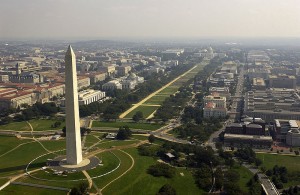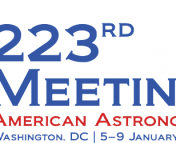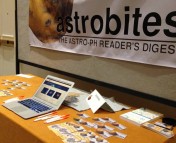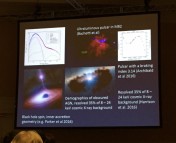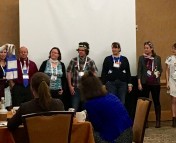The 223rd meeting of the American Astronomical Society kicks off this weekend. This year, the meeting is taking place in National Harbor, Maryland, just outside of Washington DC. There will be hundreds of talks and posters during the conference, covering every subfield of astronomy. You can check out the schedule here (but be warned! This is an 800 page PDF file!) or an abbreviated format here.
The things you absolutely do not want to miss are the events Astrobites is participating in! Look below for more information about our liveblogging effort, our exhibit hall booth, our table at the undergrad reception, and our poster presentation.
I won’t be at the conference!
As usual, we will be liveblogging the conference from right here at Astrobites. Our team of 14 (!) authors landing in D.C. will keep you up to date with all the events at the conference. Like we did at the recent AAS meetings in Long Beach and Austin, we’ll have two posts per day, with short updates to providing summaries of exciting results and press conferences. As you might imagine from the headline, we’ll also be posting updates on Twitter, so follow us (@astrobites) to find out the latest news, 140 characters at a time! Be sure to also check out AstroBetter, which will also be updating regularly throughout the conference.
I will be at the conference!
If you’re an undergrad, be sure to check out the undergraduate reception on Sunday evening at 6:00 PM in “Maryland Ballroom A.” We’ll be there – come say hi!
If you’re a graduate student, you might be interested in one or more of the professional development sessions: AstroBetter has an excellent post outlining all of these! A few sessions that Astrobites readers may be particularly interested in are:
Careers 101: Career Planning Workshop for Graduate Students and Postdocs
Monday 9:30am-11:30am, Potomac 1
Career Discovery Networking Reception
Wednesday 6:30pm-7:30pm, Maryland Ballroom D
Regardless of who you are, come check out our booth in the exhibit hall and our poster on Thursday!
We’ll also be sharing a booth with AstroBetter (Booth #505). Come check it out and pick up some Astrobites swag (pens, magnets, bookmarks!) and a Bingo card! There will be prizes.
Our poster is:
445. 13. Updates from Astrobites: The Astro-ph Reader’s Digest
9:00 AM – 2:00 PM; Exhibit Hall ABC (Gaylord National Resort and Convention Center)
Benjamin Montet; Nora Elisa Chisari; Jessica Donaldson; Courtney D. Dressing; Christopher Faesi; Joshua T. Fuchs; Korey Haynes; Susanna Kohler; Elizabeth Lovegrove; Elisabeth A. Mills; Erika Nesvold; Elisabeth R. Newton; Alice Olmstead; Meredith L. Rawls; Nathan E. Sanders; Justin A. Vasel; Lauren M. Weiss; the Astrobites team
We’d love it if you stopped by and said hi, and you don’t want to miss the follow-up poster presentation to our most recent, award-winning presentation by Astrobiter Sukrit Ranjan at the American Geophysical Union conference!
Finally, the following Astrobiters will be giving scientific presentations at the conference. If you see them, stop them and say hello! Their presentations are below, ordered chronologically.
Josh Fuchs, Poster 154.13
The High and Low Accretion States of the Eclipsing Polar LSQ 1725-64
Monday, 9:00 AM – 6:30 PM; Exhibit Hall ABC
Lauren Weiss, Oral Presentation 105.04
A Relation between Mass and Radius for 59 Exoplanets Smaller than 4 Earth Radii
Monday, 10:00 AM – 11:30 AM; Maryland Ballroom A
Zachary Slepian, Poster 245.08
Detecting the Relative Velocity Effect with SDSS
Tuesday, 9:00 AM – 6:30 PM; Exhibit Hall ABC
Courtney Dressing, Oral Presentation 206.04
Updating the M Dwarf Planet Occurrence Rate by Injecting and Detecting Transits in Kepler Light Curves
Tuesday, 10:00 AM – 11:30 AM; Maryland Ballroom A
Susanna Kohler, Oral Presentation 210.04D
Interaction of Relativistic Jets with Their Environments
Tuesday, 10:00 AM – 11:30 AM; National Harbor 11
Elisabeth Newton, Oral Presentation 215.06
Empirical Estimates of Fundamental Properties for Nearby M Dwarfs Based on Near Infrared Spectra
Tuesday, 10:00 AM – 11:30 AM; National Harbor 5
Nathan Sanders, Oral Presentation 216.01
Type IIP supernova progenitor properties from Pan-STARRS1 light curves
Tuesday, 10:00 AM – 11:30 AM; National Harbor 2
Korey Haynes, Oral Presentation 230.08
Exoplanet Secondary Eclipses Using WFC3
Tuesday, 2:00 PM – 3:30 PM; Maryland Ballroom B
Betsy Mills, Oral Presentation 238.01
Extreme Gas Properties in the Central 10 Parsecs
Tuesday, 2:00 PM – 3:30 PM; Potomac Ballroom C
Elizabeth Lovegrove, Poster 354.11
Supernova Shock Breakout Light Curves and Spectra from CASTRO Multigroup Radiation Simulations
Wednesday, 9:00 AM – 6:30 PM; Exhibit Hall ABC
Christopher Faesi, Oral Presentation 312.06
Diagnosing Pressure in Molecular Clouds through Observations and Simulations
Wednesday, 10:00 AM – 11:30 AM; National Harbor 13
Erika Nesvold, Oral Presentation 303.01
SMACK: A New Algorithm for Modeling Collisions and Dynamics of Planetesimals in Debris Disks
Wednesday, 10:00 AM – 11:30 AM; Potomac Ballroom C
Ben Montet, Oral Presentation 334.03
LHS 6343: Precise Constraints on the Mass and Radius of a Transiting Brown Dwarf Discovered by Kepler
Wednesday, 2:00 PM – 3:30 PM; National Harbor 13
Meredith Rawls, Oral Presentation 405.04
A Tale of Two Red Giants: Testing Asteroseismic Scaling Relations with KIC 9246715
Wednesday, 10:00 AM – 11:30 AM; Maryland 2
Jessica Donaldson, Oral Presentation 424.05D
Peering into Terrestrial Planet Formation: New Studies of Young Debris Disks
Thursday, 2:00 PM – 3:30 PM; Maryland Ballroom B
Elisa Chisari, Oral Presentation 426.01D
Intrinsic alignments: cosmology from the large scales & constraining the non-linear regime
Thursday, 2:00 PM – 3:30 PM; National Harbor 13
We hope to see you there!

